On Oct. 26, the oldest church in Buncombe County — First Presbyterian Church of Swannanoa — held a Sunday service in celebration of its 220th anniversary. It was also the final service the church would hold.
With an aging congregation and dwindling membership, the church — founded in 1794 — had been exploring various options for its survival for the past decade, explains the Rev. Sam Hobson, who served as First Presbyterian’s transitional minister from November 2013 until its closing. It was after one of the more generous financial donors died earlier this year that the congregation elected to disband.
Two hundred twenty years of generations gathering, worshipping and praying week after week — and now no more. Why?
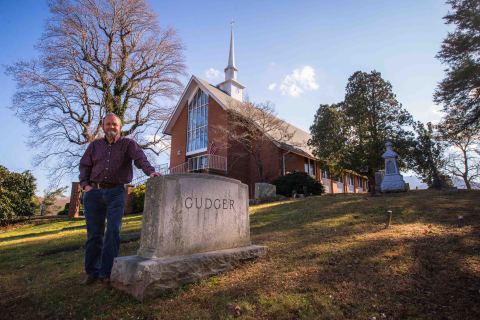
First Presbyterian is only one local example within a national trend of struggling traditional Protestant churches that are seeing aging membership, scarcity of funds and emptier pews. In the emerging milieu of the 21st century, many traditional churches are being challenged to find new strategies to meet a rapidly changing culture.
For Hobson, it’s nothing new: “Every church has a life cycle, and they had just reached the end of theirs. There’s no church that I know of that existed during the time of the Bible that is still in existence.”
Still, he acknowledges that something profound is taking place.
“The church is in a transitional period,” reflects Hobson. “[One theory purports that] every 500 years, the church has to remake itself.” Now that we’re about 500 years out from the Reformation, he explains, “The church is going to have to decide what’s the next way we’re going to exist? It cannot continue in the way that it has been doing church — largely because what we’re seeing is that the younger generations have trouble dealing with the institutionalized version of it.”
Come as you are
Casey Kelly, 27, and her husband, Kyle Kelly, 25, are members of Seacoast Church in South Asheville. Though she was raised Catholic, Casey departed from the tradition in college. “It just seemed very ritualistic,” she says, “which is why I love it here — because it’s not like you have to put on your Sunday best and sit there, and then stand, and sit, and kneel, and do all of these rules where you don’t know what you’re doing, and you don’t know what you’re praying for.”
Like many contemporary churches, Seacoast is nondenominational and has multiple campuses — the main one being in Charleston, S.C., where the founding pastor, Senior Pastor Greg Suratt, delivers sermons in plainclothes and everyday vernacular to 5,000-6,000 people on any given Sunday. The sermons are streamed in and screened live at the satellite campuses.
On Sunday morning in Asheville, Seacoast’s service starts at 9:30, but people flow in and out casually throughout the service, some getting coffee and chit-chatting in the lobby, others diligently taking notes on the sermon and none attracting more or less attention for their personal style of engagement.
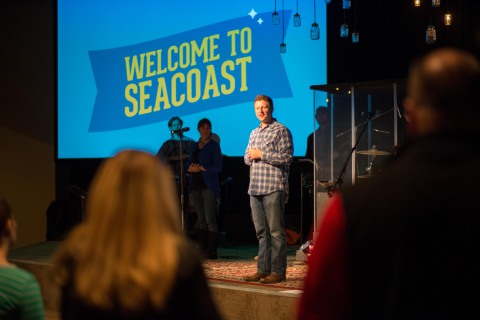
It starts with a live band — guitar, drums, bass and backup singers — bathed in stage lighting and laying down uplifting Christian rock songs and adapted hymns with the lyrics displayed on large screens behind them. Children spontaneously trickle up through the aisles to the open area in front of the stage and dance around. Some of the adults sing along, while others sit or stand with arms crossed, arms wide open, arms waving — it’s all good.
“In church growing up, you had to look perfect,” says Casey Kelly. “You looked like everything was together, and you didn’t show that you had problems. Whereas here, I come some Sundays and bawl my eyes out if something’s on my heart … and it doesn’t really matter.”
Defying national trends, Seacoast’s Asheville campus has continued to grow since its inception in 2006, usually seeing a Sunday attendance of around 300 people.
“Out of everyone in our peer group, I could probably name just a handful that still go to the old, traditional-type churches,” says Casey Kelly. “For our age, this is more of our style of church because it isn’t that ‘fire and brimstone’ feel — we have tattoos, we drink beer — and the message from most traditional churches is that all of that is sin.”
As Seacoast’s worship director, Aaron LaFalce, 31, is responsible for the music and other aesthetic aspects of services. Raised Catholic, he found the church six years ago after multiple attempts worshipping within several other Protestant denominations.
“[But] there was something in all of them where I was feeling a lot of rules and regulations and not a lot of relationship,” he says. The good fellowship drew him to Seacoast, combined with what he found to be a refreshing message: “That Jesus is not here to be the hall monitor of your life and tell you how many things you’re doing wrong, but is rather here to say: ‘I love you and I want to have a relationship with you.’”
Like LaFalce, campus Pastor Alex Johnson, 33, grew up going to church. Though reticent to criticize his experiences in the traditional church, he still notes, “I don’t think they took seriously enough that God is actually alive and moving and wants to be in relationship with us.”
Church and Christianity aren’t just about abstract philosophy, or memorizing ancient narratives, Johnson explains. Instead, the church has to meet a culture where it’s at, and it has to be contemporary for people to be able to connect with a living God that they can relate to their own experience.
Though statistically it is the younger — and particularly, millennial — generation that’s showing up less in the pews, there are contingents of elders as well whose needs are not being met by the mainline churches.
Louis Daniels, 71, discovered Seacoast after spending most of his life in the Methodist and Baptist churches. For he and his wife, Brenda Daniels, the music and style of Seacoast is nice — it’s engaging and uplifting, and they like to be around a diverse age group — but that’s not the critical draw for them. The kicker is that the teachings are biblically based.
“Many churches are advertising ‘contemporary service’ and have been for years,” says Louis Daniels, “but many of those contemporary services that are being advertised are still a Baptist or Methodist or Catholic service. There is still the same set of rules, the same belief system. … The most important thing for us is that teachings are biblically based … and to shed all of that stuff that is not biblically based. And I think most [denominational] churches … do have some rules that are not biblically based at all. And that’s been going on for thousands of years … to control people, I guess.”
What’s the word?
When First Presbyterian closed, Hobson officially retired. Not long afterward, on a visit to Charlotte, he walked into a tattoo-and-piercing studio and got his ears pierced.
“I’d wanted to do it for a while, but that was just one of those things you can’t do,” he says. And though in many ways during his ministry, he was able to deliver a message consistent with what he understood to be the word of Jesus, in others, he had to conform to institutional rules for the sake of his job.
“One of the things for younger adults is that they don’t want to be involved in something that says, ‘we love all people … except for these.’ If we say we believe in social justice for all people, we can’t say, ‘except for those people,’” says Hobson. “And the other part of it is that they want hands-on experience. You can’t just say, ‘Give us your money,’ it’s got to be, ‘Let’s go out and do something with our own hands.’”
Brooke van der Linde, 28, is a member of Jubilee! Community and attends almost every Sunday service with her 3-year-old and her husband. She describes it as a necessary “reset button” to sit for an hour and reflect on the week.
“But for me, I can’t go somewhere where gay people can’t feel comfortable. I can’t go somewhere where different nationalities and different ethnicities are not equal. However much good you are preaching from any book, my generation isn’t really having it anymore,” she says.
“There’s this divide here of wanting to connect to your religion, but leaders aren’t upholding the social values that a lot of us are coming around to having, which are largely that this whole ‘love’ thing really shouldn’t be limited.”
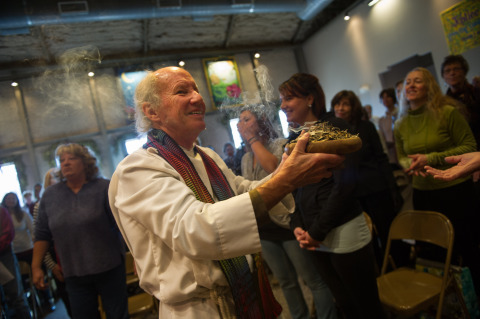
The Rev. Howard Hanger, founder and minister of Jubilee!, says, “If a church is going to call itself Christian or describe itself as following the teachings of Jesus, then it ought to be doing what Jesus did: feeding the hungry, clothing the naked, healing the sick, visiting the prisoner — whatever it takes to make the world a better place … And that’s what I think so many churches have forgotten about.”
Jubilee! does not call itself “Christian,” though Hanger bases the services, teachings and community action on the Bible. But he also incorporates teachings from other scriptures such as the Tao Te Ching and Qur’an. The “Jubilants” (regular attendees) may or may not even identify as Christians.
“Jesus never said, ‘Build a building in my name. He never said, ‘Establish a religion’ … The Christian church is supposedly the largest real estate holder in the world … and all of this in the name of a pauper,” he reflects.
Hanger hails from a line of Methodist minister-activists, and was originally ordained in that denomination. Jubilee! even had its start in the basement of Central United Methodist Church in 1984. In 1989, when there was enough critical mass, Hanger and the board members relocated to what is still their location at 46 Wall St.
“We call it a community. When we founded it, the people said, ‘The word ‘church’ has too much baggage,’ and also ‘church’ has come to be what people call a building. …. The original meaning was the people, so we thought ‘community’ expresses that better,” explains Hanger.
“I think mainline churches are missing the boat. The reason I’m not a Methodist anymore is because I got booted … for doing gay weddings. And the Methodists still don’t permit it — they can’t see the writing on the wall. … And we’re talking about love here — if you want to get all hung up on genitals, then go for it, but if you’re going to follow the teachings of Jesus: Love one another.”
On a recent Sunday morning, the seats at Jubilee! are filled for the 9:45 service. Natural morning light streams in from windows encased by exposed brick walls. An acoustic/electric band welcomes attendees with jazzy, world-influenced melodies and a song by Mumford & Sons. A large cast sculpture of the Earth hangs from the central rafter, hovering above the altar.
Throughout the service, there are multiple opportunities to hold your neighbor’s hand, greet them, embrace them. A poem spiced with personal, social and political flavors is offered by one of the members whose birthday it is; a local singer-songwriter performs; and sage is burned as the 300-400 attendees turn in unison to face the four directions in the traditional Native American manner as Hanger leads in prayer.
Those present range from millennials to elders in their 70s and 80s, plus parents of many ages in between accompanied by their children.
Mimi Shackelford, 78, was raised Presbyterian and spent a large part of her adult life in the Episcopal Church. She has collaborated with Hanger since Jubilee!’s beginning and has been a board member since its inception. “I think people either grow up in a church and stay there, or they search for what they need. And I think most people have found Jubilee! because they were searching,” she says.
When asked why the younger generations are leaving traditional mainline church pews, she says: “You all are diverse. You are accepting of all kinds of people, all kinds of lifestyles. You know when something happens on the other side of the world immediately and you react to it, and that’s different from what we knew. We knew our little town and that was about it.”
Statistically, the younger the generation, the more positive an attitude toward other cultures and religions. That attitude comes with a frame of reference: Are one’s day-to-day considerations based on identifying/interacting with a global community, a national community or even a completely localized community?
Getting back to the basics of Jesus’ teachings may look like quite different things for different generations. Perhaps there is no disagreement between different churches or generations about the importance of “loving thy neighbor,” but just how that might look.
Many millennials may not even know their neighbor, all the while easily connecting with issues and people that are physically on the other side of the globe — and they demand spiritual support that is adept within that context.
Hobson believes that historically, the church has been too acquiescent to society’s dominant culture and often ends up promoting the status quo when it should be questioning it.
“If a culture is not seeking social justice, if it is not seeking inclusivity, then the church should question it — both within and outside of the church itself. The perfect church would be one in which every nation of the Earth could be seen represented — worshipping in one place. But the way church is now, institutionally, is that it’s the most segregated time of the week. On Sunday morning for many, they go to a place where everybody looks and thinks just like they do — why is that?”
As the rules of churches change, as they strive toward inclusivity, contemporary services and breaking with the past, will people continue to seek out subcultural enclaves on Sundays? And if so, what can or should the church do about it?
Love thy neighbor
“The church is, first, the body of Christ,” says the Rev. Milly Morrow of The Cathedral of All Souls in Biltmore Village. “The people gathered in remembrance of Christ and Christ’s work in their world. And it’s for us to continue that — which is work of justice and mercy. We as humans don’t always prioritize justice and mercy, and so it is this constant need to subvert that human tendency for commerce, for gaining wealth and power.”
Morrow is co-founder of Kairos West Community Center, which opened at 742 Haywood Rd. in June, funded through a grant from the national Episcopal Church. Morrow describes Kairos as a place of “radical welcome” and highlights its mission as “simply being a sacred space where people can build community by being together, but also specifically to work with people who are emerging in the community as leaders and have a particular vision … around social justice and mercy.”
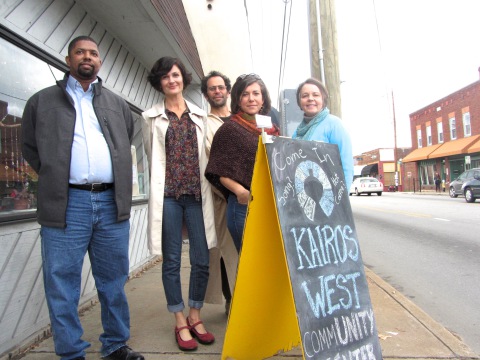
With representation from multiple denominations and a central place amid the bustle of Haywood Road, the founders of Kairos envision it as a neutral, open meeting ground and place for collaboration across subcultural, socio-economic and racial lines.
So far as checking cultural enclaves and that human tendency toward material gain, Morrow, along with Karios’ six other co-founders, selected West Asheville because of a shared concern that it was sliding toward gentrification.
“We asked: ‘Who’s becoming central here?’… and how can we make the needs of the community central again and not just a place to buy and sell things,” says Morrow.
Since launching, Kairos has partnered with 16 groups that now use the space, including the Asheville Radical Mental Health Collective, Asheville Youth Mission, Soulspeak youth poetry collective and Asheville Transformers (advocacy and support for the trans community in Asheville), to name a few. It has also collaborated with Hillcrest Apartments in an early voting March and Roll to the Polls, held a vigil for Ferguson, Mo., and launched ongoing free food markets and potlucks.
Kairos co-founder Rev. James Lee grew up on Burton Street in West Asheville. He’s seen a lot of changes in the neighborhood over the past decade. Now minister at St. Paul Baptist Church, he explains that his congregation is largely an aging population; young to middle-aged adults are largely absent. But he’s seeing a renewed interest among the youth in the church about making connections with the elder generation — but creating that connection is difficult.
“We’ve come to a point where oppression that was more subtle is becoming more blatant again. But there is this question, ‘Where do we go?’ Do we revert back to the tactics of the civil rights movement, and who’s going to lead that?” says Lee.
Lee sees the elder population feeling at a loss of how to be useful in confronting modern problems; at the same time, the youth hunger for guidance but are eager for more radical and contemporary approaches. Connecting those generational polarities is vital to empowering the community, and the ministry is an indispensable leader in that effort.
“Wisdom without strength is foolish and strength without wisdom is foolish,” says Lee.
“If we continue to do church in the same way, it will be a dead church,” he says. “And the black church, as far as being a vibrant part of the African-American community, will no longer exist. What will that mean for the church, and what will that mean for our community?”
For Lee, Kairos is serving as a place that multiple faiths, nonfaiths and diverse cultures can use to further the common cause of justice and community empowerment — something that’s hard to achieve in a standard church building where subcultures, ethnic groups or similar socio-economic strata tend to congeal — no matter how much “come who may,” is preached.
The village well was once the place where people got to know their neighbors and where they solved problems and offered condolences. We all need to drink regardless of what we believe. And like water, the organizers of Kairos believe we need justice, expression, communion and mercy. Co-founder Bill Buchanan explains they are not “marketing” to a particular culture nor prescribing what culture should look like — they’re simply catalyzing initiatives and individuals in this community that are meeting those human needs. For him, such an approach — with or without doctrine — is the way of Jesus.
The walls came down
The best time to plant perennials is in the fall; plants put energy into their roots during the cold months of winter so that they can gather nutrients to blossom and yield fruit again. Perhaps a similar phenomenon is happening in churches as well.
“Maybe church is not going to be so much a building as it will a group of people,” reflects Hobson. “And that was the early church, too. What we’ve done to the church is we’ve institutionalized it, and part of that came about through the whole adoption of the Roman Empire of Christianity — and it was forced on people to be the religion of the state … and even the Reformation was followed by its own institutionalization.”
The current state of affairs may be alarming for many churches. It may seem like failure; it may seem like the religion is endangered. But others view it as a good thing: Leaves are falling and it’s an opportunity for the religion to get real with its roots.
“[Historically] there is something that has survived and thrived and has gotten better when it’s gotten harder culturally,” says Johnson, the Seacoast campus pastor. “And I think Christianity is at its best when it’s not in a position of power. Anytime we are tempted to use the means to this world to adapt to our ends — we really lose our opportunity.”
LaFalce agrees: “Christianity is at its strongest when it’s not on top as far as handing out laws and handing out have-tos, because that’s not the way the faith started to begin with. It wasn’t something that was legislated. People were held captive by the love that Jesus had.”
The rise of the unaffiliated is a real thing. The demand for inclusivity, the closing of churches — all real. But is the opportunity to commune within the church threatened for future generations?
“I think people will find it,” says Hanger, Jubilee!’s founder. “Since we began, we’ve always sought to connect … with each other and with what we don’t understand. People are going to find it one way or the other. I’m convinced of that.”
The statistics are informative, but they don’t denote a lack of interest in communing with each other, the divine, or even, perhaps, Jesus Christ — just a waning of traditional expressions of how it’s done. One thing that the statistics don’t consider is that people have their own definitions of religion.
As he steps away from his tenure as a Presbyterian minister, Hobson will keep a hopeful eye on the future: “What a lot of public schools have been teaching is that there is no meaning whatsoever,” he says. “But human beings have always sought meaning in life — and so we’re always going to be creatures of religion. But it’s how we see that meaning and how we get there. Ultimately, if you start listening to all religions, we’re called to love one another — but how does that happen? It happens in community, and that gives meaning and purpose.”



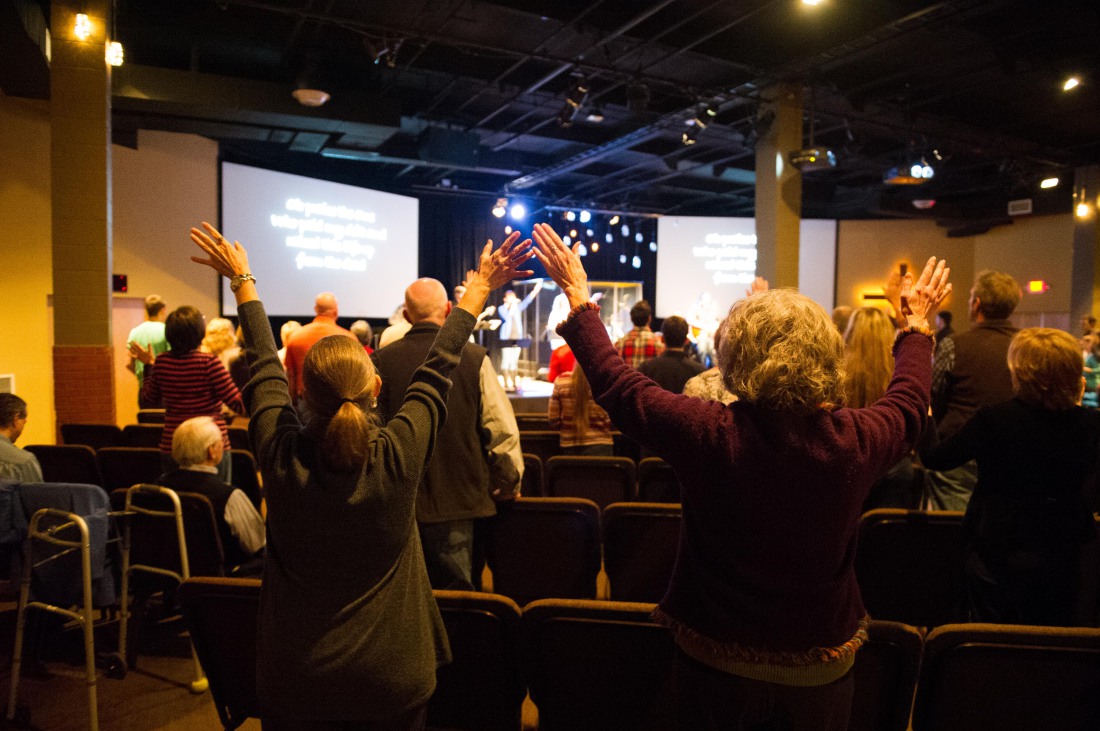
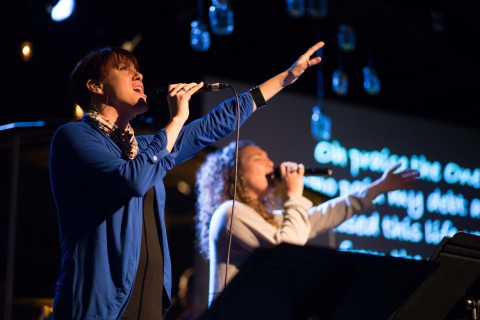
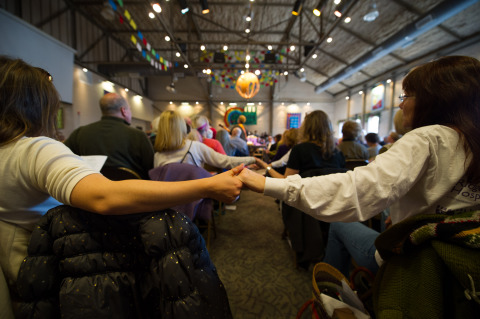
What an informative post, thanks! James Sullivan